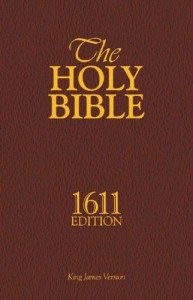 This week marks the 400 year anniversary of the printing of the most widely read book in history, the King James Version of the Bible. The influence of this translation in the English speaking world is unsurpassed, not only in the sphere of religion, but also in literature and politics.
This week marks the 400 year anniversary of the printing of the most widely read book in history, the King James Version of the Bible. The influence of this translation in the English speaking world is unsurpassed, not only in the sphere of religion, but also in literature and politics.
I am sure we are all aware of the King James Only crowd who constantly blight Churches and individuals with their wreckless and often viscious attacks on anyone who uses another translation. Their banner cry of “If it’s not King James, its not the Bible” is not borne out of sound scholarship, yet they make a loud noise. I for one am not going to allow that noise to dampen by enthusiasm and thankfulness to God for something He has used greatly through the centuries.
Thomas S. Kidd writes, “The KJV’s publication signaled the triumph of the Reformation in England, or at least the belief that the Bible should be available in the vernacular language. John Wycliffe and William Tyndale were the trailblazers in England. Tyndale’s 1526 translation was burnt as a “pestiferous and most pernicious poison,” and Tyndale himself was subsequently burnt as a heretic in Belgium. But by 1611, the moderate Anglican King James I had become convinced that there needed to be a standard English-language translation. King James’s translators depended heavily on earlier English translations; more than three-quarters of the 1611 KJV derives from Tyndale’s Bible. The KJV cemented the notion articulated in 1637 by theologian William Chillingworth that the Bible, and “the Bible only, is the religion of Protestants.””
I had an Uncle named Floyd (who is now with the Lord), who told me some fun stories of a young convert to Christ that he was seeking to nurture and disciple in the faith. Using the King James Version, my uncle sought to read and then explain Bible passages to him. While reading one such passage in James chapter 1, “count it all joy when ye fall into divers temptations,” my Uncle notice a very puzzled look on the face of the young convert.
“What are you thinking?” my Uncle asked.
The young man replied “what are “divers temptations”, and why would divers have different temptations to the rest of us? I like to go diving from time to time. This is very troubling. Are Christians not supposed to dive? I just bought some new flippers three weeks ago!”
On another occasion, my Uncle was reading through 1 Timothy 3. In outlining the qualification for elders, the text said “not greedy of filthy lucre”. Once again seeing the puzzled brow of the young disciple, my Uncle asked, “what is filthy lucre?”
The young man paused for a moment before saying, “well, the Bible was written in the Middle East, where there’s lots of sand. I think filthy lucre is the stuff camels leave behind in the desert! I think Elders are being warned not to step in it or try to gather it up to sell it.”
Humor aside though, the world has a greater understanding of God and His gospel because of the King James Bible. Scholars today have far greater resources at their disposal to understand the original Hebrew and Greek than what was available 400 years ago. It would even be true to say that many modern translations (such as the NASB, ESV and NIV) are based on a more reliable Greek text than the KJV used, yet the King James Version of the Bible is still a wonderful translation in many ways and deserves a place in every Christian home.
In this video below, Justin Taylor conducts a very informative interview with Dr. Leland Ryken regarding the history of the King James Bible. Professor Ryken is the author of the recently released book “The Legacy of the King James Bible: Celebrating 400 Years of the Most Influential English Translation.”
Justin Taylor Interview: Leland Ryken, “The History of the King James Bible” from Crossway on Vimeo.
